I completed the Precision Nutrition Certification Level 1 back in 2015 when I was personal training at Virgin Active in Glasgow Finnieston (now Nuffield Health). Precision Nutrition, founded by Dr. John Berardi, is a well-respected online nutrition coaching platform. You might remember their popular infographics on meal plans, healthy foods, and the “cost of getting lean” – a unique perspective on the sacrifices required for ultra-low body fat levels.
Back then, Precision Nutrition was a big deal, and Virgin Active had a special deal for trainers. Instead of the usual $1,000, I paid around $600. Five years later, I enrolled in Level 2, which was far more advanced, impactful, and life-changing (for me) than Level 1. So, is Precision Nutrition worth it? In short, yes, I highly recommend it, but it’s quite expensive ($2,600). If you’re interested in a deep dive into the course review, expectations, and what I learned, keep reading.
What Is Precision Nutrition?
Precision Nutrition is a nutrition coaching company founded in 2005 by Dr. John Berardi and Phil Caravaggio. Initially focused on individual weight loss coaching, they’ve expanded into the education space, developing highly-regarded curriculum and courses for fitness professionals, like myself. While its size is difficult to compare directly against the competition, Precision Nutrition claims to be the largest and most respected private nutrition coaching and education company in the world.
Is Precision Nutrition accredited? Yes, the PN Nutrition Certification is accredited in the United States and Canada, qualifying for continuing education credits. This is recognized by the American Council on Education (ACE) and international organizations such as the National Academy of Sports Medicine (NASM), the American College of Sports Medicine (ACSM), the Athletics and Fitness Association of America (AFAA), and more. The team behind Precision Nutrition is badass too, with PhDs in fields like nutritional biochemistry, sport psychology, women’s studies, food science, and human nutrition, along with registered dietitians, nutritionists, and strength and conditioning coaches.
So what is it about Precision Nutrition that made me buy their courses? My knowledge of nutrition was limited (literally). When I started working as a personal trainer in Glasgow at Virgin Active in the West End, I already had a Sport Science diploma from UCLAN University and a personal training course from YMCAFit which I’ve done in Manchester. But both of these courses did very little in terms of nutrition coaching. And, since most of my clients whom I’ve trained in the Finnieston gym wanted to lose weight, I knew that it didn’t matter what exercise plan I gave them. They wouldn’t be able to outwork a bad diet.
The second reason why I chose to start the Precision Nutrition Certification Program was the steep discount I was getting as part of the Virgin Active gym. My manager, Kirstie Barrie, got me a deal and explained that since I was part of the Virgin Active personal trainers group, I could get 40% off Precision Nutrition. So, I went ahead, spent around 600 pounds, and got the whole thing delivered to my apartment in East Kilbride within 7 days. Here’s a photo of the Precision Nutrition Level 1 textbook, “The Essentials of Sport and Exercise Nutrition.”
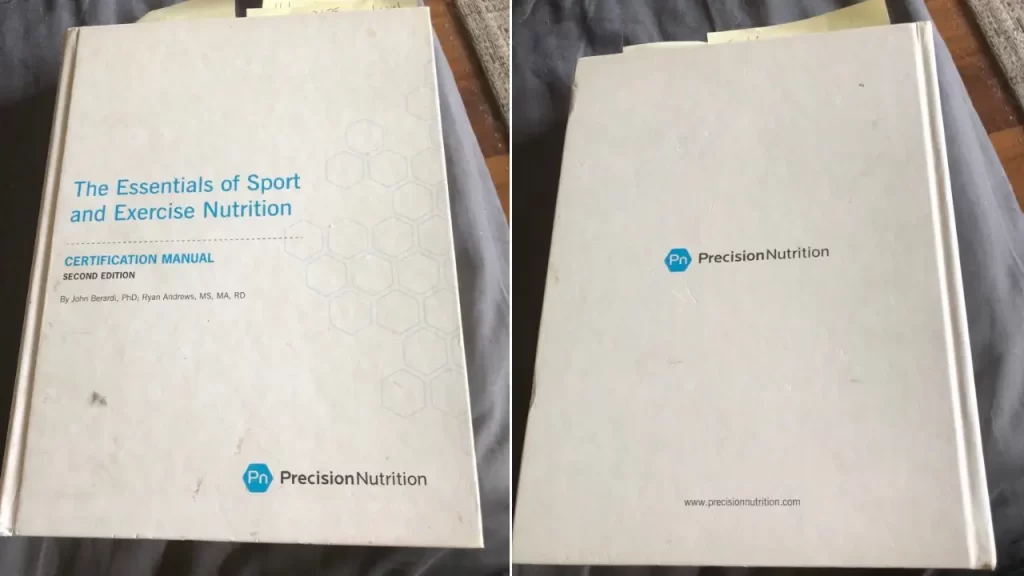
As you can see in this photo, this Precision Nutrition Level 1 textbook is worn out, to say the least! This textbook served as my nutrition encyclopedia for the last 8 years. It’s over 500 pages long, and to be frank, it can feel overwhelming if you’re not familiar with nutrition science. However, it covers everything you need to know about nutrition from the body’s functions, macronutrients (proteins, carbohydrates, and fats), micronutrients (vitamins and minerals), phytochemicals, the digestive system, energy transfer, nutrient metabolism pathways, the body’s energy needs, supplementation, and more.
What I like about the Precision Nutrition course program is its easy-to-read format; it’s scientific but avoids the overly technical jargon like you would find in Pubmed research studies. And, when new scientific vocabulary is introduced, the material is explained in a way that’s understandable for someone at an 8th-grade reading level. So how does Precision Nutrition work?
How Does the Precision Nutrition Certification Work?
Precision Nutrition Certifications has both self-paced and structured learning options. Their Level 1 Nutrition Certification and Level 1 Sleep, Stress Management, and Recovery Coaching Certification are self-guided. This means you can progress at your speed, take exams when you’re ready, and work without deadlines. You could complete the course in five weeks or five months if you want. In contrast, the advanced Level 2 program is a completely different animal. Here you follow a strict weekly schedule with deadlines for quizzes, case studies, and assignments from your coach. Since I’ve completed both Precision Nutrition Level 1 and Level 2, let me explain how these two programs differ from each other.
How Does the Precision Nutrition Level 1 Work?
Precision Nutrition’s Level 1 certification is a self-paced online course structured around 20 textbook chapters and 2 main units (science and coaching). The first unit focuses on the theoretical aspects of nutrition science, covering definitions, processes, and systems. For example, the early chapters of Unit 1 introduce basic concepts like cell structure in the context of nutrition. Later chapters expand on this, explaining how organs and systems are involved in digestion and absorption, all the way to macronutrients, hydration, supplementation, and how stress and recovery impact nutritional needs. Each chapter has a clear objective, definitions, descriptions, a summary, and real-life case studies.
The following table shows you the complete curriculum for Unit 1 from Precision Nutrition Certification Level 1.
| Chapter | Title | Description |
|---|---|---|
| 1 | Introduction | Overview of the program and key coaching principles. |
| 2 | Your learning plan | Guides on setting expectations and navigating the learning path. |
| 3 | What is a great coach? | Intro to Nutritional Science |
| 4 | Helping people change | Introduces a 5-S formula for client progress in challenging times. |
| 5 | What is good nutrition? | Explains the absence of a “best diet” and the use of data in nutritional choices. |
| 6 | Intro to nutritional science | Offers a brief overview and the importance of science for coaches. |
| 7 | Systems and cells | Covers body systems and nutrition’s role in cellular health. |
| 8 | Through the GI tract | Details on digestion, nutrient processing, and more. |
| 9 | Energy transformation and metabolism | Discusses energy derivation from food, transfer, and macronutrients’ roles. |
| 10 | Energy balance | Examines energy acquisition, expenditure, measurement, and balance adjustment. |
| 11 | Macronutrients | Reviews major macronutrients, their necessity, and consumption recommendations. |
| 12 | Micronutrients and whole foods | Highlights micronutrients and the benefits of whole, less processed foods. |
| 13 | Water and fluid balance | Focuses on hydration and body fluid regulation. |
| 14 | Stress, recovery, and sleep | Looks at stress response, recovery enhancement, circadian rhythms, and sleep’s significance. |
Chapters 1 to 14 are from Unit 1, called “The Science of Nutrition,” while chapters 15 to 20 are from Unit 2, the practice part.
For me, Precision Nutrition Level 1 Unit 1 is like building your academic knowledge about how your body works and the optimal nutrition for function. The second unit, on the other hand, is radically different. It focuses on coaching in practice, teaching you how to give solid nutritional recommendations to your clients. According to Precision Nutrition, giving any nutritional advice starts with collecting important information about your clients’ health, diet, and lifestyle in the form of questionnaires, assessments, and detailed intake forms.
You get access to over 40 different assessment tools. These include:
- Diet Satisfaction Assessment: This evaluates your client’s satisfaction and the effectiveness of their current diet regarding well-being, energy levels, food choices, lifestyle, cooking skills, cravings, digestion, performance, and recovery.
- Initial Assessment & Triage Questionnaire: This helps you gather basic client information and determine areas of focus.
- Deep Health Questionnaire & Assessment: This provides a comprehensive understanding of your client’s health, lifestyle, environmental factors, readiness for change, and coaching expectations.
Here you can see screenshots of the examples from the PN assessment toolbox.
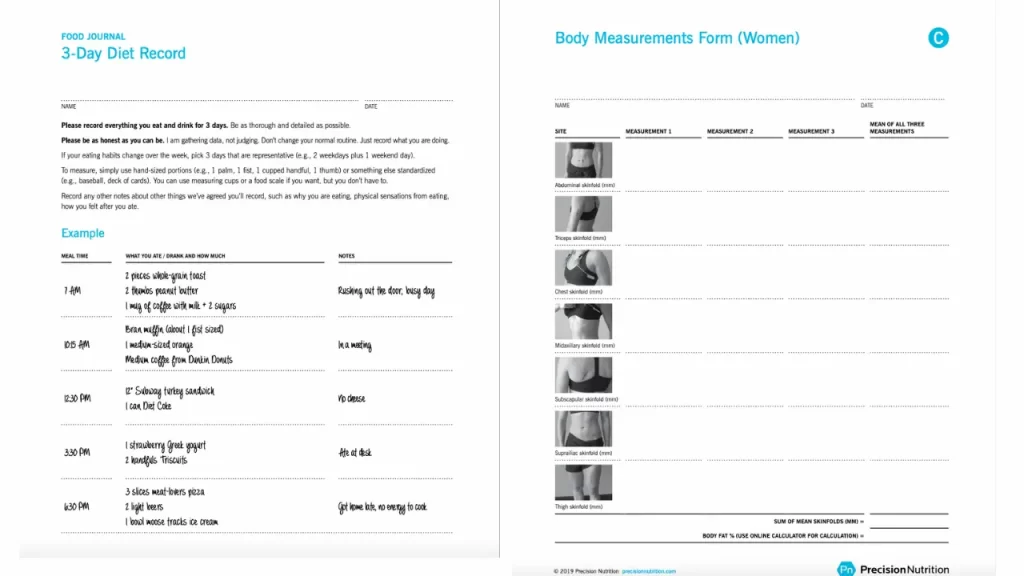
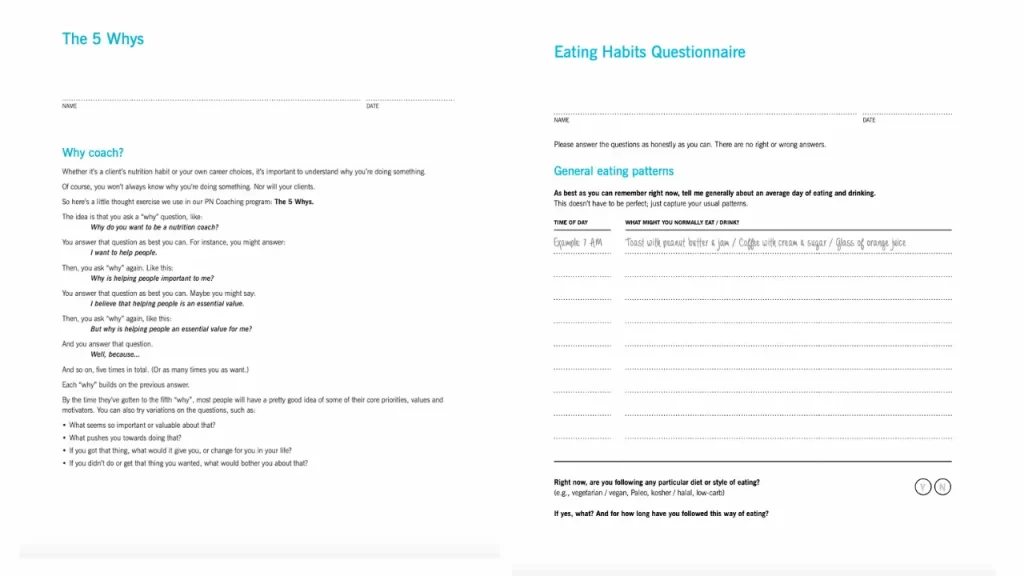
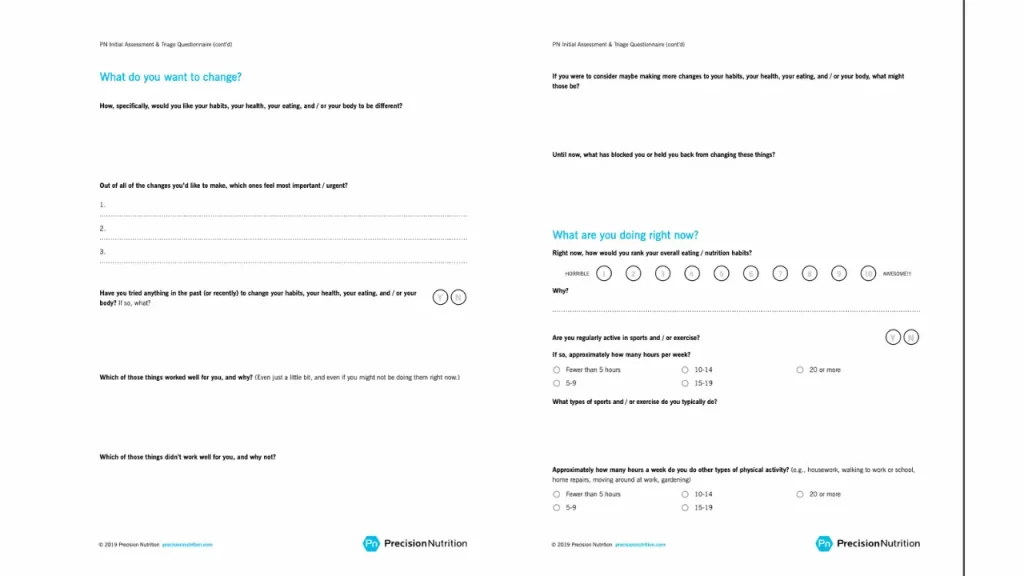
So yeah, the amount of PN worksheets, Q&As, and logs you get does feel overwhelming. These tools range from simple 3-day food journals to in-depth psychological assessments exploring social life, relationships, belief systems, and more. Once you’ve gathered essential information, you’ll use it to shape your nutrition advice and provide your clients with actionable practices they are ready, able, and willing to do.
How many habits do you assign to each client? Only one at a time. Precision Nutrition coaching emphasizes focusing on a single, achievable habit to ensure client success (that is also the core of their PN Level 2, which I will cover below). For example, if your initial assessment shows your client needs help with estimating their macro intake, meal planning, or carb cycling, you might introduce the beginner-friendly Precision Nutrition hand portion guide as the first practice, which is a simple way to measure food intake using hand size.
But how do you ensure your client will follow through? Precision Nutrition’s Unit 2 teaches you how to implement daily journals, logs, and tracking sheets. These tools help you assign practices and monitor client progress. For example, if you introduce the Precision Nutrition hand portion guide as a weekly practice, your client would log their adherence three times a day, corresponding to meals.
Then, during your weekly or bi-weekly coaching sessions, you’d review these logs with your client to assess their progress and create their next action steps. If they’ve mastered food journaling, you might introduce a more advanced method like counting calories or weighing foods. But if they’re struggling with journaling, you’d simplify the task. This way, each coaching session focuses on reviewing adherence charts and sheets and providing a new (or modified) habit based on the insights you gain.
The following table shows you the curriculum for Unit 2 from Precision Nutrition Certification Level 1.
| Chapter | Title | Description |
|---|---|---|
| 15 | Coaching in practice | Describes PN’s 6-step coaching process and adapting to client levels. |
| 16 | Working with Level 1 clients | Identifies foundational skills and practices for all clients. |
| 17 | Working with Level 2 clients | Provides tactics for clients with specific goals or those undertaking complex tasks. |
| 18 | Working with Level 3 clients | Aids in achieving specific, short-term, aggressive goals for advanced clients. |
| 19 | Special scenarios | Deals with common issues like injuries, food sensitivities, aging, disordered eating, and more. |
| 20 | Business 101 | Outlines business models, enhancing coaching efficiency, client attraction, and reputation building. |
My biggest takeaway from Unit 2 of Precision Nutrition’s Level 1 program was to focus on collecting only essential data about clients and prioritizing actions they are willing to take, one at a time. While the PN coaching program teaches you how to use dozens of tools for assessment and progress tracking, this doesn’t mean you should use them all at once.
For example, advising a new personal training client to immediately undergo complete blood work, genetic fitness testing, or fMRI scans would be excessive, potentially overwhelming, and expensive. A better approach would be to start with a simple meal journal, eating habits questionnaire, and body measurements. Based on this information, you decide your client’s next habits and find easy ways to monitor their compliance.
So, is Precision Nutrition Level 1 certification worth it? Yes, I find this course to be worth it because it focuses on both nutrition science and coaching practice. Although it is quite pricey, it is especially beneficial for personal trainers, strength coaches, massage therapists, life coaches, chiropractors, physiotherapists, or anyone who wants to work with clients to help them lose weight.
Is Precision Nutrition Level 1 Certification Expensive?
Yes, Precision Nutrition Level 1 Certification is expensive. It costs $600 upfront or $29 down then $59 per month for 11 months, though they offer a 45-day refund guarantee. While the course includes accreditation, a certificate, and assessments, the core information can be found in books, research studies, or even with AI tools like ChatGPT. Nevertheless, the PN Level 1 curriculum is well-structured and easy to understand. If you have the budget, I highly recommend it. For those with a larger budget, I also suggest the Precision Nutrition Level 2 coaching course.
How Does the Precision Nutrition Level 2 Work?
Precision Nutrition Level 2, also known as the Master Health Coaching Certification, is an advanced 12-month nutrition mentorship program designed for nutrition coaches, personal trainers, and health professionals such as registered dietitians, nutritionists, nurses, and doctors.
I began the Precision Nutrition Level 2 coaching program on October 7th, 2019 while working on board Celebrity Equinox as a Fitness Director, so I had ample opportunity to practice my skills with clients. Of all the PN courses I’ve completed—including the Level 1 Nutrition Certification (started in 2015), the Definitive Guide to Intermittent Fasting (started in May 2020), and the PN Level 1 Sleep, Stress Management, and Recovery Coaching Certification (started in October 2023 but not yet finished)—the Precision Nutrition Level 2 coaching program was the most intense, complex, and life-changing (for me). It was also the most expensive private course I’ve taken ($2,600).
That is a lot of money and it raises the question: is this almost-three-thousand-dollar course worth it? And how exactly does PN Level 1 differ from PN Level 2? The key difference is that the Precision Nutrition Level 2 coaching program focuses primarily on coaching psychology rather than nutrition science. For example, the course doesn’t cover topics like glycemic index, muscle protein synthesis, or cell membranes. Instead, the Level 2 course focuses on a wide range of coaching psychology topics. These topics include from somatic psychology, body awareness, mindfulness, self-compassion, motivational interviewing, stress management, mental skills training, and even the complex field of psychoneuroimmunology.
Just like PN Level 1, the Level 2 course uses an online platform. You’ll receive a login and password to access course materials, including habits, lessons, reviews, case studies, quizzes, and personalized feedback from your coach. Upon logging in, your dashboard displays daily lessons for you to read. New lessons are released every weekday (Monday to Friday), with Saturdays dedicated to weekly recap reviews or case studies. When you see ‘no lesson today,’ it usually means you have nothing to work on that day because you have a case study due.
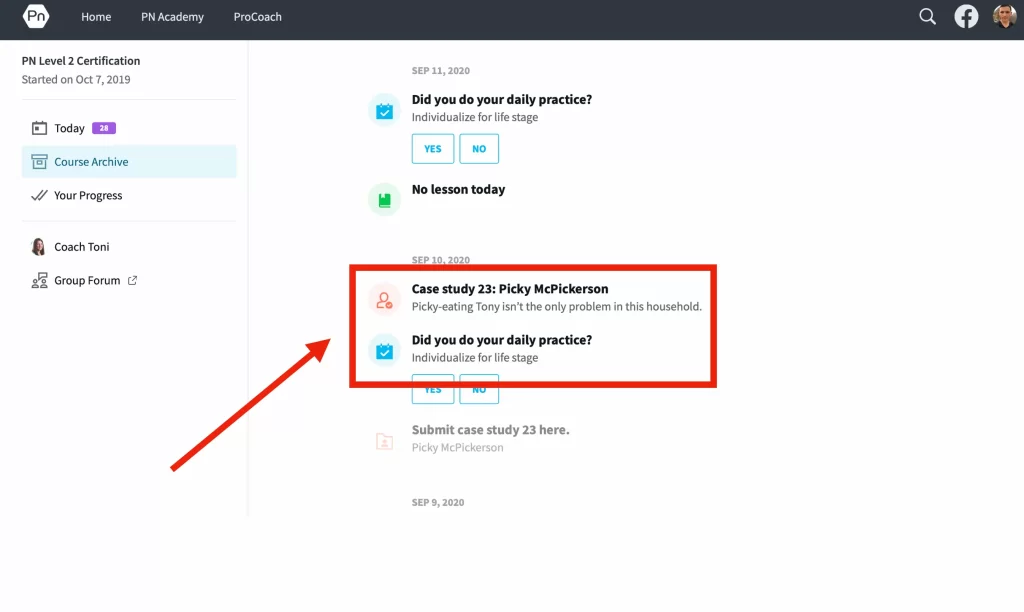
Unlike with PN Level 1, PN Level 2 doesn’t include a certification manual or textbook. You need to ‘show up’ every day by login in to the platform and complete your daily lessons. So, how do the PN Level 2 lessons look? The lessons are the primary way you ‘consume’ the course content. To me, reading these daily lessons felt almost like reading a good daily newsletter from an experienced copywriter: the vocabulary, tone of voice, storytelling, and sense of humor were all fresh, punchy, and easy to understand – even when covering complex topics like neuroscience, interoception, or neuroplasticity.
Each lesson comes with a main content, followed by “What to do today” section at the bottom that shows you your daily task for the day. While the daily tasks are not overly difficult, they go beyond simple yes-or-no questions. These open-ended, reflective questions encourage you to rethink what you’ve learned (and might even reference previous lessons). Here’s the screenshot of what the PN Level 2 dashboard looks like.
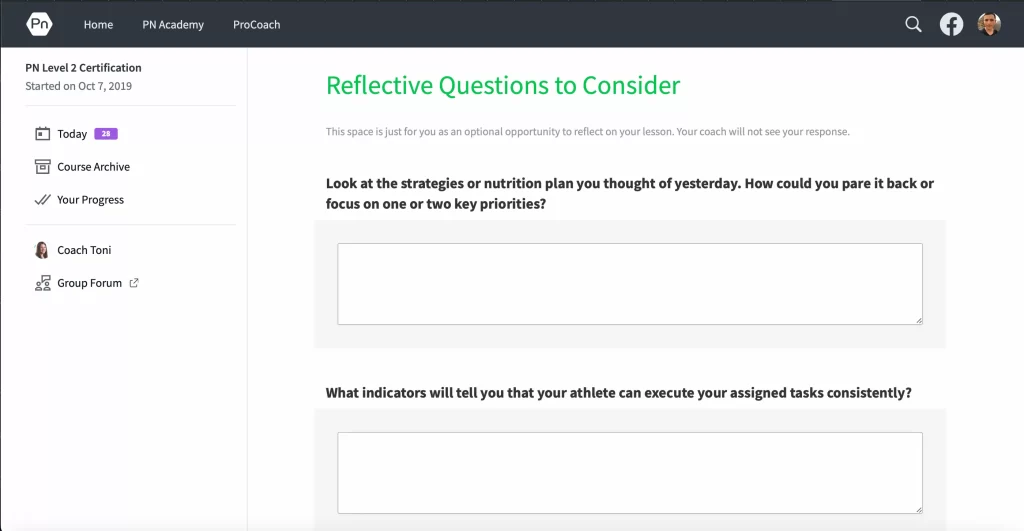
Besides daily lessons, you also have to track daily habits. There’s a lot to unpack here, but the core principle of the PN Level 2 coaching program is the one-habit method popularized by Leo Babauta in his book, ‘The Power of Less.’ This method focuses on a single behavior change at a time to prevent overwhelm, and promote sustainable habits. It’s the foundation for both their 1-on-1 coaching clients and how they teach you to coach your clients. But to effectively teach this method, you first need to experience it yourself.
What habits are we talking about? Initially, they’re simple and easy to follow, like finding time (which is scheduling time in my calendar for studying the course) or walk the walk (which asks me to reflect on my desired coaching style). As the PN Level 2 program progresses, the habits become more in-depth and practical. These include using assessment tools (which requires working with real-time clients), giving positive feedback (which involves identifying and highlighting your clients’ small victories), and recording food intake (which means using a food journal to document your feelings, thoughts, and eating pace). This screenshot shows the dashboard where you have to check in daily and mark whenever you did your daily feedback.
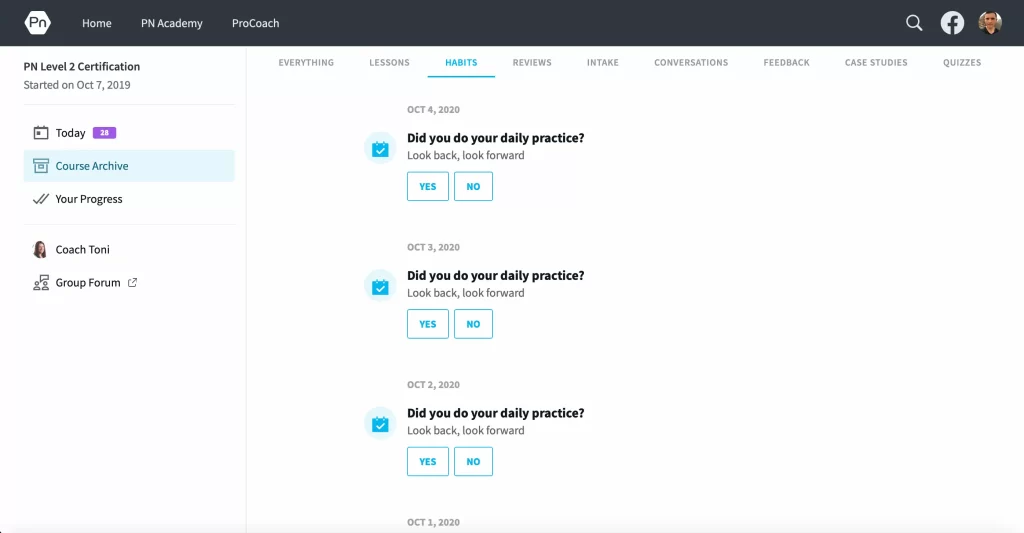
Another part of the Precision Nutrition Level 2 coaching program involves case studies. These scenarios challenge you to ‘play’ the role of a coach in complex situations that go beyond simple diet and exercise. For example, you might deal with a 26-year-old female client who wants to lose weight but struggles with hormonal issues, sleep problems, and hasn’t had her period for the last two years. Or, you might work with a client full of “can’t-do” energy, seeing everything as an obstacle, or a local MMA fighter who has issues with alcohol and struggles to meet weight standards and recover from fights.
So how do you actually solve these case studies? The PN Level 2 case studies are, to say the least, challenging. They require more than just recalling course lessons; you’ll need deeper thinking, creative problem-solving, and sometimes even the opportunity to work with real clients. So its not easy. And, as the course progresses, the difficulty increases with each case study. All case studies are assessed by PN Master Coaches, and you need a score of around 70% to pass to get certification.
What’s more, the case studies, habits, and lessons are all interconnected. What I mean is that you don’t get to work and study everything about mindfulness while doing some random case study about supplements. For example, you might be learning about somatic psychology and building body awareness in clients in your lessons while practicing body mind scan as a daily habit, and then applying both to a case study focused on a client struggling with irritable bowel syndrome (IBS) exacerbated by stress, irregular eating habits, and possibly diet. Every two weeks, you get a new habit to practice daily, about ten new lessons spread across two weeks, and one related case study.
My favorite part of the Precision Nutrition Level 2 coaching mentorship was the ‘Further Reading’ section after the lessons. This is where you’ll find recommendations for books related to the given topic if you want to learn more. The whole course includes around 50 book recommendations, ranging from psychology titles like Carol Dweck’s “Mindset,” Karen Koenig’s “The Rules of Normal Eating,” Brené Brown’s “The Gifts of Imperfection,” and Stephen S. Hall’s “Wisdom: From Philosophy to Neuroscience,” to many more.
Is Precision Nutrition Level 2 Certification Worth It?
Yes, Precision Nutrition Certification Level 2 is worth it because it teaches you more than just nutrition definitions. It covers practical coaching and psychology strategies that I use with all of my clients to help transform their mindset, motivation, and lifestyle. It also served as the foundation for my own nutrition course on Udemy, “Secrets To A Flatter Stomach,” which applies the same principles on a smaller and more affordable scale. For me, the biggest disadvantage of PN Level 2 was the cost, as both PN courses aren’t cheap. However, I believe it offers excellent value for money and highly recommend it.
